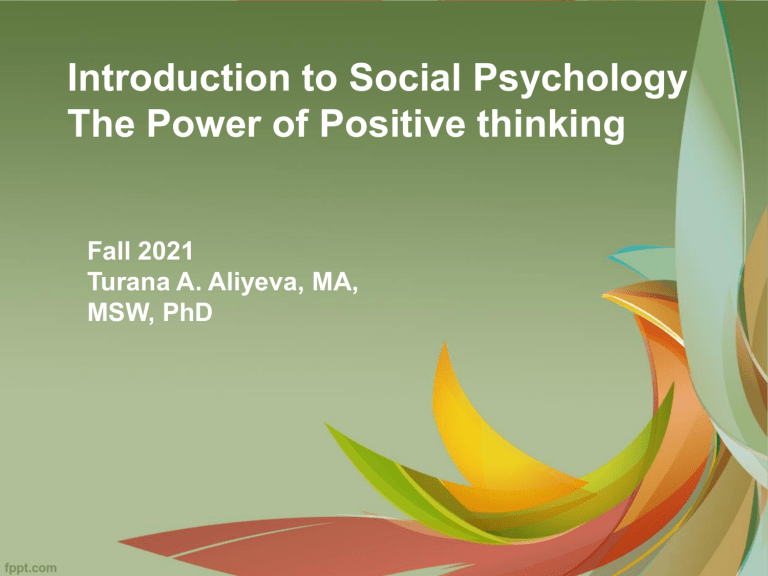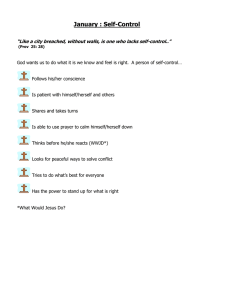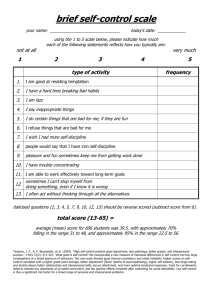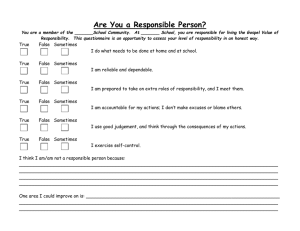
Introduction to Social Psychology The Power of Positive thinking Fall 2021 Turana A. Aliyeva, MA, MSW, PhD Conflict When most people see themselves as more moral and deserving than others, conflict among people and nations is a natural result. Self-efficacy • Self-efficacy concept – a scholarly version of the wisdom behind the power of positive thinking (Albert Bandura, 1986). • Self-efficacy – an optimistic belief in our own competence and effectiveness Self-efficacy (cont.) • Self-efficacy is how competent one feels to do something. • Self-efficacy and the control over the outcomes are linked to each other • One may, feel like an effective driver (high self-efficacy), yet feel endangered by drunken drivers (low control). Self-esteem & self control • Depression and perception of reality • Non-depressed people and positive illusions about things such as control in life. Low self-esteem • People with low self-esteem want pretty much the things people with high self-esteem want: – Their desires are the same. – They want to be loved. – They want to succeed. But they don’t expect it as much. • People with high self-esteem kind of assume it will happen, they’re kind of shocked when it doesn’t. • People with low self-esteem don’t really think it’s going to happen, to be loved to be successful, and when it does they’re sometimes a little skeptical, like this might be too good to be true Low self-esteem • Low self-esteem people tend to be more focused on avoiding disaster than on achieving success The dark-side of selfesteem • People with low self-esteem often have problems in life—they make less money, sometimes abuse drugs, and are more likely to be depressed • Low self-esteem is seemingly caused by tough childhoods. • High self-esteem does have some benefits—it fosters initiative, resilience, and pleasant feelings Narcissism & self-esteem • An inflated sense of self • High self-esteem and value given to both individual achievement and relationships with others • Narcissism and caring for others Locus of control • What do you think about your own life? • Are you more often in charge of your destiny, or a victim of circumstance? Locus of control (cont.) • a. In the long run, people get the respect they deserve in this world. • b. Unfortunately, people’s worth passes unrecognized no matter how hard they try. Locus of control (cont.) • a. What happens to me is my own doing. • b. Sometimes I feel that I don’t have enough control over the direction my life is taking. Locus of control (cont.) • Internal locus of control • External locus of control Learned helplessness versus self-determination • When people believe their efforts have no effect they are more likely to become passive Uncontrollable bad events Perceived lack of control Learned helplessness Locus of control • Promotion of personal control will indeed promote health and happiness The cost of excess choice • individualistic modern cultures have “an excess of freedom,” causing decreased life satisfaction and increased rates of clinical depression (Barry Schwartz, 2000, 2004) . Self-control • Childhood self-control predicts all manner of successes in adulthood • People with good self-control do actually get better grades • They are more successful in their work after they leave school, they earn higher salaries Self-control • Lower self-control makes you more vulnerable to being unemployed • People with good self-control are more popular, they have more stable, lasting friendships • They’re actually happier, partly because they have less stress in life. Self-control & health • People with high self-control are better adjusted, mentally and physically • • The ultimate outcome is living longer • Self-control and living longer Self-control & longevity • Intelligence • People with good self-control do indeed live significantly longer than people with poor selfcontrol. Self-control & longevity People with high self-control: • Smoke less • Drink less • Behave better • People with high self-control do better, enjoy life more and actually live longer. Activity What are the benefits of having high self control compared to having low self control? • • • • • • • Better grades Better fashion sense Higher intelligence Longer lasting relationships More stable friendships Happier Live longer What is high self-control? There are three basic components of it: • Standards (ideas of how you should be, they are goals, moral principles, ideals, norms, other people’s expectations) • Monitoring (keeping track of the behavior) • The capacity to change, willpower is the popular term for it. Any of these three components go wrong, it can undermine your ability to control yourself effectively Achieve your goals! Think of a goal that you are working towards. Using the three components of self control, break down the elements to clarify your strategy on attaining your goal. • Standards - What are they? Are they realistic? • Monitoring - How are you monitoring your progress/behaviour? Are you regularly tracking your behaviour? • Willpower - What can you do to keep your willpower high? REFERENCES Myers, D.G. (2011). Exploring Social Psychology. (6th ed). McGraw-Hill Higher Education. (Module 5). QUESTIONS, QUESTIONS, QUESTIONS





